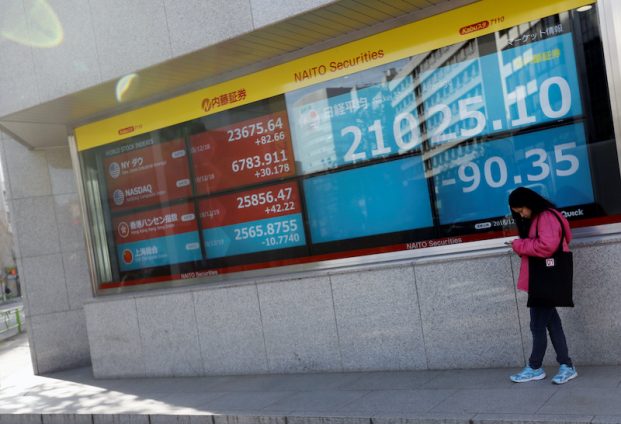Hong Kong and Chinese stocks suffered on Tuesday weighed down by growing China concerns and worries over the continuing impact of Beijing’s regulatory restrictions on tech companies.
Hong Kong plummeted by its biggest margin in three weeks after a four-day holiday with the Hang Seng Index shedding more than 2.7% before recovering with the Shanghai Composite Index also slipping.
Chinese stocks slipped despite the authorities vowing to support the economy amid a Covid-19 outbreak, with investors watching whether tough pandemic controls might be relaxed.
China will step up its financial support for industries, companies and people affected by Covid outbreaks, the central bank (PBOC) said on Monday.
Also on AF: China EV Maker Leapmotor’s Sales Surge Boosts IPO Hopes
This came after data showed China’s economy slowed in March as consumption, real estate and exports were hit hard, taking the shine off faster-than-expected first-quarter growth numbers.
“But the real growth bottlenecks remain,” Nomura said in a note. “Adjustments to China’s zero-Covid strategy are key to a growth recovery in coming months.”
China’s blue-chip CSI300 index fell 0.8% to 4,134.90, while the Hang Seng Index plunged 2.28%, or 490.32 points, to close at 21,027.76.
Hong Kong-listed tech giants closed down 3.8%, leading the declines on the Hang Seng. Video and live-streaming platform Bilibili slumped more than 10%, after China banned live-streaming of unauthorised video games on Friday.
Food delivery giant Meituan plunged nearly 6%, after Shanghai’s market regulator said on Monday it had summoned 12 e-commerce platforms including Meituan and eleme.me over topics including price gouging during the pandemic.
China Semiconductor Stocks Fall
The Shanghai Composite Index ended the day 0.05%, or 1.5 points, lower at 3,194.03, while the Shenzhen Composite Index on China’s second exchange fell 0.11%, or 2.24 points, to 2,020.28.
Chinese healthcare firms and semiconductor stocks slipped 2.2% and 2.7%, respectively, while energy stocks gained 2.6% and infrastructure companies added 1.2%.
Consumer staples edged down 0.2%, while new energy vehicle stocks ended lower 0.5%.
But Tokyo stocks ended higher on bargain-hunting after shares dipped following modest falls on Wall Street with South Korea, Taiwan, India and Australia all edging upward too.
The benchmark Nikkei 225 index added 0.69%, or 185.38 points, at 26,985.09, while the broader Topix index gained 0.83%, or 15.62 points, to 1,895.70.
Fed Poised to Raise Rates
European shares were lower on Tuesday, while yields on 10-year US inflation-linked bonds were close to turning positive for the first time in two years, as the prospect of aggressive Fed tightening to rein in inflation kept investors on edge.
Investors were also preparing for the next barrage of earnings that will help them assess the impact of the Ukraine war and a spike in inflation on company financials.
The MSCI world equity index, which tracks shares in 50 countries, was 0.1% lower.
The Federal Reserve looks all but certain to raise its interest rate by 50 basis points when it meets next month and a 75 basis point hike hasn’t been ruled out.
The dollar index rose above 101 for the first time since March 2020, as the greenback hit a 20-year high against the yen and tested a two-year peak on the euro, amid higher US Treasury yields.
Yen Dips Again
The divergence in monetary policies between Japan and the United States has pushed the yen to its weakest level against the dollar since 2002.
Oil prices edged lower but remained near their highest since mid-March as investors worried over tight global supply after Libya was forced to halt some oil exports as forces in the east expanded their blockade of the sector.
Brent crude futures were last down 1.0% at $112.00 a barrel. US crude futures were down 1.1% at $106.99 a barrel.
Gold prices were steady after coming within an inch of reaching $2,000 an ounce during Monday’s session. Spot gold was last at $1,979.84 an ounce.
Key figures around 0830 GMT
Tokyo – Nikkei 225 > UP 0.69% at 26,985.09 (close)
Shanghai – Composite > DOWN 0.05% at 3,194.03 (close)
Hong Kong – Hang Seng Index > DOWN 2.28% at 21,027.76 (close)
Brent North Sea crude > DOWN 0.47% at $112.26 per barrel
West Texas Intermediate > UP 0.66% at $107.16 per barrel
New York – Dow > DOWN 0.1% at 34,411.69 (Monday close)
London – FTSE 100 > DOWN 0.10% at 7,608.33
- Reuters with additional editing by Sean O’Meara
























